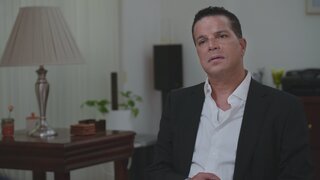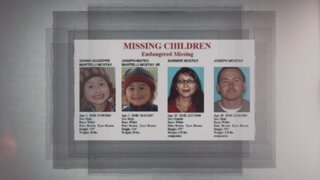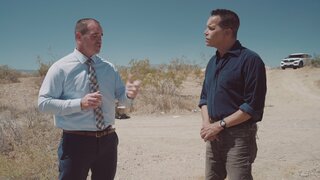What Clue Led Investigators To Discover The McStay Family’s Killer?
Joseph McStay, his wife Summer, and the couple's two young sons mysteriously disappeared in Feb. 2010. It would take years for investigators to discover the family's grisly fate.
When Joseph McStay, his wife Summer, and their two young sons disappeared from the family’s Fallbrook, California home in February 2010, it was as if they’d simply vanished into thin air.
“The house was as if somebody just beamed them up to the Starship Enterprise,” reporter Tony Shin, who covered the case for KNSD-TV, recalls in the latest episode of CNBC's “American Greed,” airing Monday at 10 p.m. ET/PT. “There was a couple bowls of I believe popcorn that it looked like the boys were eating, possibly watching TV. There’s a carton of eggs on the table as if maybe Summer or Joseph … were about to make some food or something and the dogs, they had two dogs, they were just left there.”
For years the family’s mysterious disappearance would continue to baffle investigators until a motorcyclist riding the trails in the Mojave Desert on Nov. 13, 2013 made a gruesome discovery. The man found a small human skull that appeared to belong to a child.
Investigators from the San Bernardino Sheriff’s Department soon uncovered the bodies of all four McStay family members—including Joseph, Summer, 4-year-old Gianni and 3-year-old Joseph Jr.—buried in two shallow graves in the harsh desert.
But the killer remained a mystery until investigators uncovered a disturbing clue they said pointed them toward Joseph McStay’s close friend and business associate, Charles “Chase” Merritt.
The pair had met through Joseph’s successful decorative waterfall business, Earth Inspired Products. Merritt was a fabricator, who Joseph had turned to to expand the custom side of his business.
“Charles Meritt did the welding, creating some of the metal work, the fountains, and Joseph was the businessman behind it all, and from all accounts, he was flourishing,” Shin tells “American Greed.”
Publicly Merritt—who had several prior convictions on his record—claimed to be Joseph’s best friend, once telling CNN’s Randi Kay that although they began as work acquaintances, they quickly grew to be friends, playing paintball together and sharing dinner a few nights a week.
But privately, investigators noticed Merritt had displayed some concerning behavior after the family disappeared.
In an interview with detectives just two weeks after the family was last seen, Merritt talked about his friend in the past tense.
When questioned about his choice of language by investigators, Merritt said he had “no idea why” he'd done that.
“He seemed caught off guard, like ‘Oh, I didn’t realize I was doing that,’” San Bernardino County District Attorney Britt Imes tells “American Greed.”
Merritt would also make a bold claim about his last contact with Joseph.
Merritt told investigators that on Feb. 4, 2010, the day the family disappeared, Merritt and McStay met for lunch at a Chick-Fil-A restaurant in Rancho Cucamonga for a business meeting.
“We just had to go over all kinds of money stuff,” Merritt told detectives in an interview recording obtained by “American Greed.”
But he’d also tell Kay during his television interview that he had “definitely” been the last person to see Joseph.
The comment struck investigators as odd.
“Chase went on TV and talked about his relationship with Joseph and one of the key statements that he made was something to the effect of he was definitely the last person who saw Joseph alive,” San Bernardino County Sheriff’s Sgt. Eddie Bachman tells “American Greed.” “That kind of cued into us as a red flag there because I don’t know how any one person could be certain and say that he was the last person that saw his best friend alive if he wasn’t in fact the last person who saw him alive.”
Although both instances raised investigators' suspicions, another glaring clue would ultimately put Merritt at the center of the investigation.
Merritt told detectives that during their last lunch meeting, Joseph had given him physical copies of checks to pay for some of the projects they were working on.
San Bernardino County Det. Dan Hanke tells “American Greed” that when investigators examined Joseph’s QuickBooks account they did, in fact, discover a series of checks made out to Merritt or other vendors that Merritt owed money to that were dated Feb. 4, but the metadata stored within the computer revealed that the checks had not actually been written that day.
They were actually written several days after the family disappeared and backdated to make it appear as though they’d been issued before the family vanished.
“That was when Charles Merritt’s story started falling apart and really gave us the motive,” Hanke said.
Investigators would discover evidence that showed someone had taken control of Joseph’s checking account right before and right after he disappeared, writing a total of nine checks to either Merritt or those who he owed money to totaling nearly $15,000.
Even more troubling, a QuickBooks customer service representative told investigators he remembered an unsettling call from a man claiming to be “Joseph McStay” who wanted to completely delete his account and all information on the account, but Hanke said the phone used to call the customer service line had belonged to Merritt, not Joseph.
The caller lacked the necessary passcode to delete the account and the customer service representative was unable to carry out his request—leaving the damaging information for investigators to discover later.
Investigators also uncovered an email from Joseph dated Feb. 1, just days before the family disappeared, stating that Merritt owed him nearly $43,000.
Merritt not only had motive to carry out the grisly slayings, it seemed that he also had the opportunity. Cell phone records placed Merritt in the desert where the bodies were ultimately discovered just two days after the family disappeared. Detectives said Merritt had grown up in the area and was familiar with the terrain.
Although Merritt adamantly denied being at the location of the makeshift graves, he was arrested by the San Bernardino County Sheriff’s Office on Nov. 5, 2014 and charged with four counts of murder.
“When you look at the totality of the picture, you just came right back to it’s Charles Merritt,” Imes tells “American Greed.”
Prosecutors said he bludgeoned the family to death with a sledgehammer.
Defense attorney Rajan Maline has continued to proclaim his client’s innocence, arguing there's no physical evidence linking Merritt to the murder scene.
“Let’s make no mistake about it, Mr. Merritt is innocent,” Maline tells “American Greed.”
But jurors disagreed and Merritt was convicted and later sentenced to death for the slayings in January 2020.
“There was a huge sigh of relief. There was finally some closure for the family,” Imes says.
Joseph’s father Patrick McStay, however, continues to be haunted by Merritt’s dark deeds.
“He’s a scumbag; he’s a creep; he doesn’t deserve to walk the earth or take a breath,” Patrick tells “American Greed.” “He killed somebody that trusted in him and gave him a chance when a lot of other people knew he was a crook and then he kills my grandsons, brutally. How do you do that?”
To learn more about the case, tune into Monday's episode of "American Greed" at 10 p.m. ET/PT on CNBC.
You can also watch "The McStay Family Mystery" on Oxygen's "Killer Motive."



























